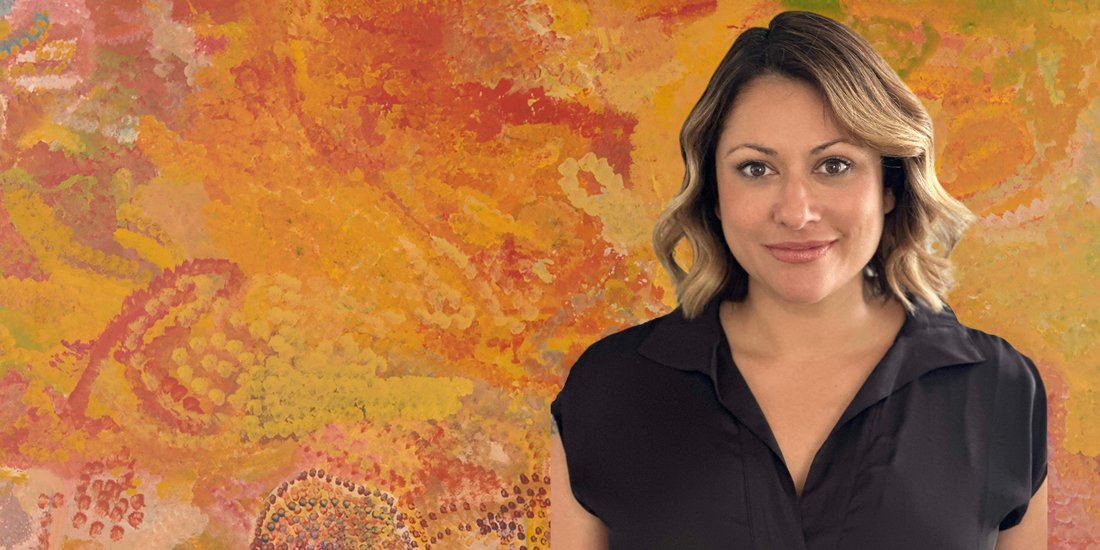Jade Ritchie, business leader and advocate
Through the Voice mechanism it will give Parliament ongoing, grassroots advice and will mean investments are made with more direction and better outcomes
When business leader and advocate Jade Ritchie recently met Prime Minister Anthony Albanese at an event, she took the chance to mention she only had one wish for her forthcoming 40th birthday. “I told him I would like him to hold the referendum on November 3 as it would be [the] best present ever,” she reveals. His response? “He just laughed,” the 39-year-old tells The New Daily as she travels around the country as a spokesperson for the Yes23 movement, speaking to the Australian public and the media about the benefits of the Voice to Parliament. We speak as Mr Albanese is poised to confirm the official date of the referendum, and Ms Ritchie explains why she took leave from her role with environmental services company Tellus Holdings, as general manager of business development, to help the ‘Yes’ camp.
It was a comment made one evening by her son Jack, 12, while watching the news when she realised she wanted to do more to help create a brighter future for all Indigenous Australian children. They were watching a segment about the fatal bashing of Indigenous Perth teenager Cassius Turvey. Cassius, a 15-year-old Noongar Yamatji boy, was allegedly chased down and attacked with a metal pole as he walked home from school with friends on October 13, 2022. “Jack went to bed crying after Cassius was killed,” Richie explains. “He said ‘I’m, either going to die early of diabetes or from a racist attack,’ – it broke my heart. “They hear about the Closing The Gap statistics all the time. They are well aware of the odds against them.” Jack and his sister Milani, 14, live in Darwin with the advocate along with her husband Brendan, an engineer. Ritchie revealed Jack has also been subject to racist abuse while playing in his footy team. “He was called a Black c-word by another child and we were all devastated by it. “The situation was made worse when we reported it and the parents of the child in question tried to minimise what had happened.” Ritchie, from the Bunda clan in Queensland, says she sought advice from AFL great Adam Goodes about the incident and whether she was right to stand up for her son. “He said to me ‘even if they feel initially embarrassed when you step in, they will know beyond a doubt their parents have got their back and one day it won’t happen any more as we have really called it out’. “It was great parental advice because you are always second guessing, so it was nice to have that validation.”
Before joining Tellus Holdings, Ritchie worked in the public sector with a focus on youth justice and Aboriginal affairs. When she asked for special leave to devote herself full-time on the busy run up to the referendum she was nervous to ask, but was delighted with the positive response from the board of directors. “They said they didn’t feel like they were doing me a favour at all. They said: ‘We want the Voice to go ahead and this is everyone coming together and saying this is the best way forward for the country’. “That really meant a lot to me.”
With a vote on the Indigenous Voice to Parliament only days away, Jade Ritchie tells us what the looming referendum means to her.
You’ve become an advocate for people to vote ‘Yes’ for the Voice. Can you explain why?
I’m very passionate about everyone voting ‘Yes’ because I truly believe that Indigenous Australians need to be recognised in the constitution. We’ve got this amazing connection to 60,000-plus years of culture, ways of doing and knowing. We should all be really proud of that in this country. When policy and legislation is made about us and not with us it can be really harmful. For two decades I’ve tried to make change within the structures in place, but it’s not working. We need to be able to broker our own solutions and this is why we need the Voice.
What does a Voice to Parliament mean to you personally and what significant impact might it have for you?
It’s just really important to me personally that we get recognised and heard and treated fairly. Battling injustice is exhausting. As an Aboriginal woman I don’t just see the numbers in the statistics, I see faces. I see the face of my auntie, who was killed by her partner. I see the faces of babies who had died too young due to terrible access to maternal health in communities. I see the face of my brother, who was locked up for a ridiculous thing that a non-Indigenous Australian would not face. I see the faces of all the Aboriginal children in Don Dale Detention Centre, where 100 per cent of the population is Indigenous. I also see the face of the 11-year-old Aboriginal boy I met in the Alice Springs detention centre. This is about real people, not statistics; we have to save lives and do something different.
What do you believe will be the main effects of a ‘Yes’ vote for Australia?
The main effect would be unifying this nation. If we come together for something as important as this it would be so beautiful because we will see better policy. Through the Voice mechanism it will give Parliament ongoing, grassroots advice and will mean investments are made with more direction and better outcomes. It will also be more time efficient because there won’t be hold ups for consultations. For example, when I worked up in Arnhem Land, school attendance statistics were low. But what those statistics didn’t show was what I was learning on the ground in conversations with parents. I learnt that because school was so far the unsealed roads were blowing out tyres, or that they couldn’t afford the fuel. When children are living in overcrowded homes where there is no money or food, those challenges really count. If we have the Voice then we are actually getting advice like this based in reality and then making better, more practical decisions.
If it fails, how will you feel and what will that mean?
At the moment I’m more interested in people than the polls. What I’m sensing right now travelling all over the country is that there is a huge amount of goodwill from non-Indigenous Australians and huge support from Aboriginal and Torres Strait Islander people, particularly elders. In fact, my favourite part of this campaign has been sitting down and having cups of tea with elders who are saying ‘We have wanted a voice for so, so long and we’ve learnt a lot of important lessons’. They are quite excited about the fact this Voice would be enshrined in the constitution. I think Australians as a whole do really care about all the matters at stake and realise this is a once-in-a-generation opportunity. If the result is a ‘No’, then firstly my response is that we are an extremely resilient people, so it wouldn’t be the end of the conversation. However, it would send us backwards in a way that would fly in the face of all the effort, and will be disappointing for the whole country.
How has it been, as an Indigenous Australian, to be subject to a heated national debate such as this?
I just find it unnecessary and it’s just disappointing when that takes up the oxygen in the room. We’ve seen some really gross and slanderous stuff. People have been making racist jokes and I don’t think the average Australian accepts that in 2023. And I think people are annoyed that is taking up space right now. The focus needs to be on the vote. I’ve got thick skin but it’s not nice when it gets personal, especially when people don’t know you. I’ve heard people say, ‘You’re Black so you don’t work and you’re just on the dole’. I can’t tell you the last time I had a day off and it’s not nice for my children to read.
If you were to advise Parliament on one issue relating to Indigenous Australians, what would it be?
Youth justice is absolutely vital, it’s so close to my heart. There are so many solutions for some of the issues that our youth face. Our youth themselves hold some of their own solutions; they know what they need, but need that safe space and encouragement to unlock those solutions. It’s all about listening, and you just need the time and the relationships. I’m bringing up two Aboriginal teenagers in the NT and my teens are amazing people. They have so much to offer and they need the nation to see them and embrace the people they are. Even though I’m away a lot at the moment I’m showing them that anything is possible – and that truth and fairness is what comes out on top.
How do you believe an Indigenous advisory body would make a difference to Australia when we have Indigenous politicians?
I get asked this a lot when we do information events. It’s awesome that we have a number of Aboriginal and Torres Strait Islander politicians, but they are representing the constituency of their electorate. The Voice does not answer to a political body – it will be independent and give frank and fearless advice. It does not have to give lip service if it can just give really good advice. So many Indigenous politicians know that and want the Voice.
As a mother of two Indigenous children, what would be the changes you’d like to see in their lifetime?
When I grew up we only spoke of our culture among our own people. I want them to know beyond a doubt that our culture is something to be proud of. It’s part of their identity and it’s something Australia as a whole can be proud of. And I don’t want any more Closing the Gap reports. I don’t want my children to be scared. I want them to live without fears and not be limited by gaps our government have failed to close.
This is part of a special series of interviews by our sibling site The New Daily ahead of the 2023 referendum on the Indigenous Voice. Read the other interviews here.

